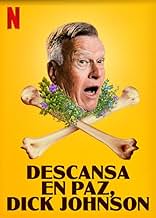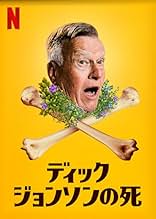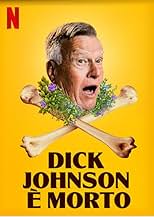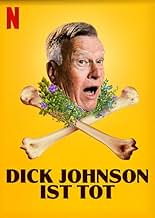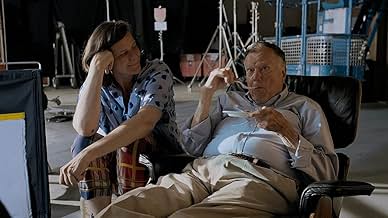NOTE IMDb
7,4/10
7,5 k
MA NOTE
Kirsten Johnson, cinéaste primée, est prête aujourd'hui à se servir de tous les trucs d'illusionniste à sa disposition pour mettre en scène la mort – de toutes sortes de manières – de son pè... Tout lireKirsten Johnson, cinéaste primée, est prête aujourd'hui à se servir de tous les trucs d'illusionniste à sa disposition pour mettre en scène la mort – de toutes sortes de manières – de son père psychiatre de 86 ans.Kirsten Johnson, cinéaste primée, est prête aujourd'hui à se servir de tous les trucs d'illusionniste à sa disposition pour mettre en scène la mort – de toutes sortes de manières – de son père psychiatre de 86 ans.
- Réalisation
- Scénario
- Casting principal
- Récompensé par 1 Primetime Emmy
- 19 victoires et 40 nominations au total
Avis à la une
To help her dad (and herself) cope with his declining health and eventual death, a woman stages fake accidents that kill her father. They're all fake, of course. They play to laughs, and inspire the title of the film, but they're really only a small aspect of the film on the whole. The story mostly focuses on their relationship and shows how special Dick Johnson is as a father, a grandfather, and a human being. He is lovable, hilarious, and perpetually happy. Everyone loves this man. You'll love him too. And you'll love this movie. It's an incredibly nuanced and intelligent examination of death, but it wisely disguises itself as a comedy so viewers can watch without openly weeping the entire time. In the end, you'll still cry, but you'll smile too.
Dying is about the deadliest topic in any medium partly because it reminds us of our last end, or as Alexander Pope said, "Send not for whom the bell tolls, it tolls for thee." An accomplished documentarian, Kirsten Johnson, takes that topic and makes it a sweet future as she orchestrates scenarios for her father's death with him starring while alive in Dick Johnson is Dead.
It is as if she believes that playing with a bit of gallows humor might at least stave off the Alzheimer's disease for her dad that her mother succumbed to a few years ago. The magic part of this unusual documentary is the love of father and daughter evident in every light-hearted scene. Be he knocked dead by a construction beam or actually experience a heart attack, she and he are collaborating on this doc as professionals (he is a psychiatrist) who know enough about life to make death an acceptable adjunct to a life that was worth living.
Dick Johnson is not much as an actor depicting his own death, but he is a father who has loved his child, his late wife, and his friends, of which he has a multitude. His love shines through in each frame making this the most realistic fictionalized death on film this year (and most likely the only one).
My other favorite doc this year is David Attenborough: A Life on Our Planet, which also defeats the death of earth through our own collaboration with Nature. In both films, life is affirmed in the face of daunting realities such as our responsibility for choking the atmosphere or just living till we die.
Kirstin's loving handling of a potentially crippling topic is a tribute to her as an accomplished filmmaker who can create in the face of heavy emotional weight. It is even more a tribute to her as a daughter who loves her father unconditionally and forever-a state she uses to keep her dad in her mind forever.
"Because I could not stop for death-He kindly stopped for me." Emily Dickinson
Thanks to my daughter, Thea, who tipped me off to this exceptional doc-we share several sympathies with the film.
It is as if she believes that playing with a bit of gallows humor might at least stave off the Alzheimer's disease for her dad that her mother succumbed to a few years ago. The magic part of this unusual documentary is the love of father and daughter evident in every light-hearted scene. Be he knocked dead by a construction beam or actually experience a heart attack, she and he are collaborating on this doc as professionals (he is a psychiatrist) who know enough about life to make death an acceptable adjunct to a life that was worth living.
Dick Johnson is not much as an actor depicting his own death, but he is a father who has loved his child, his late wife, and his friends, of which he has a multitude. His love shines through in each frame making this the most realistic fictionalized death on film this year (and most likely the only one).
My other favorite doc this year is David Attenborough: A Life on Our Planet, which also defeats the death of earth through our own collaboration with Nature. In both films, life is affirmed in the face of daunting realities such as our responsibility for choking the atmosphere or just living till we die.
Kirstin's loving handling of a potentially crippling topic is a tribute to her as an accomplished filmmaker who can create in the face of heavy emotional weight. It is even more a tribute to her as a daughter who loves her father unconditionally and forever-a state she uses to keep her dad in her mind forever.
"Because I could not stop for death-He kindly stopped for me." Emily Dickinson
Thanks to my daughter, Thea, who tipped me off to this exceptional doc-we share several sympathies with the film.
It's rare that a movie with so much good stuff in it is also quite frustrating.
At the risk of going on too long: the main problem for me was the tone. The darkly comedic fantasy sequences never quite meshed with the far more effective (and more frequent) parts of the film that nakedly deal with the inevitability of death, and the immense struggles of aging. There was one fantasy sequence which was surprising moving in a really surreal way, until it clunkily featured an intentionally jarring gag, and I was pulled right out of feeling something profound.
I just... wasn't on this movie's level- I could tell I really liked it, and almost felt like I could love it, but it never sat 100% right with me. The whole premise of killing him in make believe ways never seemed to gel with the genuine emotions of the more down to earth stuff, and it left me a bit confused. There was surely an intent and a purpose, but it's one I can't grasp.
I know there's something here I'm missing, and the stuff I got I know I really liked, so I can still say it's a good movie for sure. But it's almost like I'm missing a part of my brain that would enable me to fully "get" this movie, y'know? Almost as confusing for me as I'm Thinking of Ending Things was 😅
At the risk of going on too long: the main problem for me was the tone. The darkly comedic fantasy sequences never quite meshed with the far more effective (and more frequent) parts of the film that nakedly deal with the inevitability of death, and the immense struggles of aging. There was one fantasy sequence which was surprising moving in a really surreal way, until it clunkily featured an intentionally jarring gag, and I was pulled right out of feeling something profound.
I just... wasn't on this movie's level- I could tell I really liked it, and almost felt like I could love it, but it never sat 100% right with me. The whole premise of killing him in make believe ways never seemed to gel with the genuine emotions of the more down to earth stuff, and it left me a bit confused. There was surely an intent and a purpose, but it's one I can't grasp.
I know there's something here I'm missing, and the stuff I got I know I really liked, so I can still say it's a good movie for sure. But it's almost like I'm missing a part of my brain that would enable me to fully "get" this movie, y'know? Almost as confusing for me as I'm Thinking of Ending Things was 😅
Dick Johnson seems like a very nice guy, and it was very nice of him to do this with his daughter. Kirsten Johnson seems like a very nice woman, and this film is like a valentine to her Dad. But now we come to the film itself, which I wanted to see because the overwhelming majority of professional critics loved it. And honestly, I have no idea why. While the film had its moments, much of it was pretty boring, especially the slow-motion fantasy sequences with glitter in the air.
This film kind of reminded me of Sarah Polley's, "Stories We Tell," which was another personal story about something that happened to her family. Good people, but unless you knew the family, I didn't think it was very interesting. Most film critics inexplicably loved that one too.
This film kind of reminded me of Sarah Polley's, "Stories We Tell," which was another personal story about something that happened to her family. Good people, but unless you knew the family, I didn't think it was very interesting. Most film critics inexplicably loved that one too.
Greetings again from the darkness. Hal Ashby's 1971 cult classic HAROLD AND MAUDE takes a comical look at death, and in the process shows us the importance of living, and the jolt delivered by dying. Documentarian Kirsten Johnson (CAMERAPERSON, 2016) makes this a more personal project by involving her dad in a series of staged deaths for her film. Initially the purpose was to help him begin to deal with an end that could be coming soon, but it evolved into something altogether different.
Dick Johnson is an elderly psychiatrist. He's a charming and lively man, boasting a nice sense of humor and a twinkle in his eye. His daughter Kristen is "a camera person", and suggests to him that they make a film about him dying. He's on board. Kristen then stages various "deaths" for her father. These scenes include getting crushed by a falling air-conditioner, getting hit by a car, taking a horrific fall down stairs, and a construction site mishap. The more we get to know Dick, the more we like him. We learn it's been 30 years since he had a heart attack, and 7 years since his wife died. She suffered from Alzheimer's for years before she passed. We learn he's a Seventh Day Adventist, and loves chocolate fudge cake. My how he loves chocolate cake.
Initially gung-ho for his daughter's idea, and fully supportive of the situations she puts him in for her art, Dick begins to show signs of forgetfulness and confusion. At times we have our doubts that he fully comprehends what's happening - not just in the film, but in everyday life. The comical elements shift to wistfulness, as we are present when Dick has to shut down his practice, sell his car, and ultimately box up his belongings and move out of his beloved home. Kristen moves him to her one bedroom New York City apartment, which is right next door to that of the two fathers of her children.
In addition to the staged deaths, we also meet a stuntman who gets involved, and we are on set for the filming of Dick's "Heaven" which includes chocolate and popcorn, and his "Last Supper" featuring, among others, Bruce Lee, Frieda Kahlo, Farrah Fawcett, and Frederick Douglass. There is also a family trip to a beach in Lisbon, and a reunion with Dick's college girlfriend in California. The strangest bit is the staged funeral, replete with Dick in a coffin, and friends offering tributes. We also celebrate Dick's 86th birthday, and see many family pictures and home videos.
Leonardo da Vinci is quoted: "As a well spent day brings happy sleep, so life well used brings happy death."
Watching Dick's spirit fade along with his memory is anything but happy. His daughter Kristen tries to remain sensitive to his changing state, but the feeling we are left with is anything but happiness towards death. Her film is likely structured much differently than she originally intended, but has so much value for discussion with loved ones and a reminder of just how precious life is for those who appreciate it. Now showing on Netflix
Dick Johnson is an elderly psychiatrist. He's a charming and lively man, boasting a nice sense of humor and a twinkle in his eye. His daughter Kristen is "a camera person", and suggests to him that they make a film about him dying. He's on board. Kristen then stages various "deaths" for her father. These scenes include getting crushed by a falling air-conditioner, getting hit by a car, taking a horrific fall down stairs, and a construction site mishap. The more we get to know Dick, the more we like him. We learn it's been 30 years since he had a heart attack, and 7 years since his wife died. She suffered from Alzheimer's for years before she passed. We learn he's a Seventh Day Adventist, and loves chocolate fudge cake. My how he loves chocolate cake.
Initially gung-ho for his daughter's idea, and fully supportive of the situations she puts him in for her art, Dick begins to show signs of forgetfulness and confusion. At times we have our doubts that he fully comprehends what's happening - not just in the film, but in everyday life. The comical elements shift to wistfulness, as we are present when Dick has to shut down his practice, sell his car, and ultimately box up his belongings and move out of his beloved home. Kristen moves him to her one bedroom New York City apartment, which is right next door to that of the two fathers of her children.
In addition to the staged deaths, we also meet a stuntman who gets involved, and we are on set for the filming of Dick's "Heaven" which includes chocolate and popcorn, and his "Last Supper" featuring, among others, Bruce Lee, Frieda Kahlo, Farrah Fawcett, and Frederick Douglass. There is also a family trip to a beach in Lisbon, and a reunion with Dick's college girlfriend in California. The strangest bit is the staged funeral, replete with Dick in a coffin, and friends offering tributes. We also celebrate Dick's 86th birthday, and see many family pictures and home videos.
Leonardo da Vinci is quoted: "As a well spent day brings happy sleep, so life well used brings happy death."
Watching Dick's spirit fade along with his memory is anything but happy. His daughter Kristen tries to remain sensitive to his changing state, but the feeling we are left with is anything but happiness towards death. Her film is likely structured much differently than she originally intended, but has so much value for discussion with loved ones and a reminder of just how precious life is for those who appreciate it. Now showing on Netflix
Le saviez-vous
- AnecdotesWhen Kirsten Johnson pitched the idea to her father, she asked him, "Dad, what if we make a movie where we kill you over and over again until you really die? And he laughed".
- ConnexionsFeatures Aux origines de l'humanité: Day the Dinosaurs Died (2017)
- Bandes originalesGloria in Excelsis Deo
Written by Antonio Vivaldi (as Antonio Lucio Vivaldi)
Arranged by Andrea Montepaone
Courtesy of Spirit Production Music
Meilleurs choix
Connectez-vous pour évaluer et suivre la liste de favoris afin de recevoir des recommandations personnalisées
- How long is Dick Johnson Is Dead?Alimenté par Alexa
Détails
- Date de sortie
- Pays d’origine
- Sites officiels
- Langue
- Aussi connu sous le nom de
- Dick Johnson Đã Chết
- Lieux de tournage
- Seattle, Washington, États-Unis(workplace)
- Société de production
- Voir plus de crédits d'entreprise sur IMDbPro
- Durée
- 1h 29min(89 min)
- Couleur
- Mixage
- Rapport de forme
- 1.78 : 1
Contribuer à cette page
Suggérer une modification ou ajouter du contenu manquant





